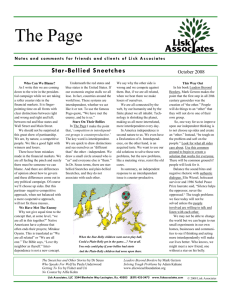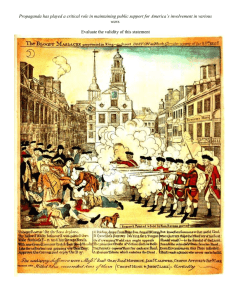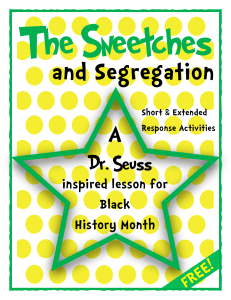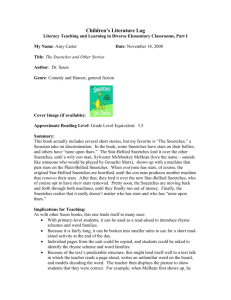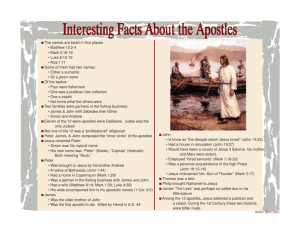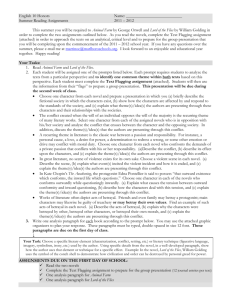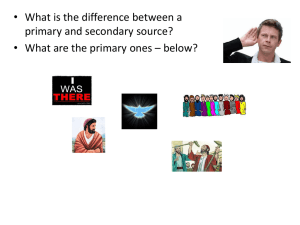Sermon text - Church of the Palms
advertisement
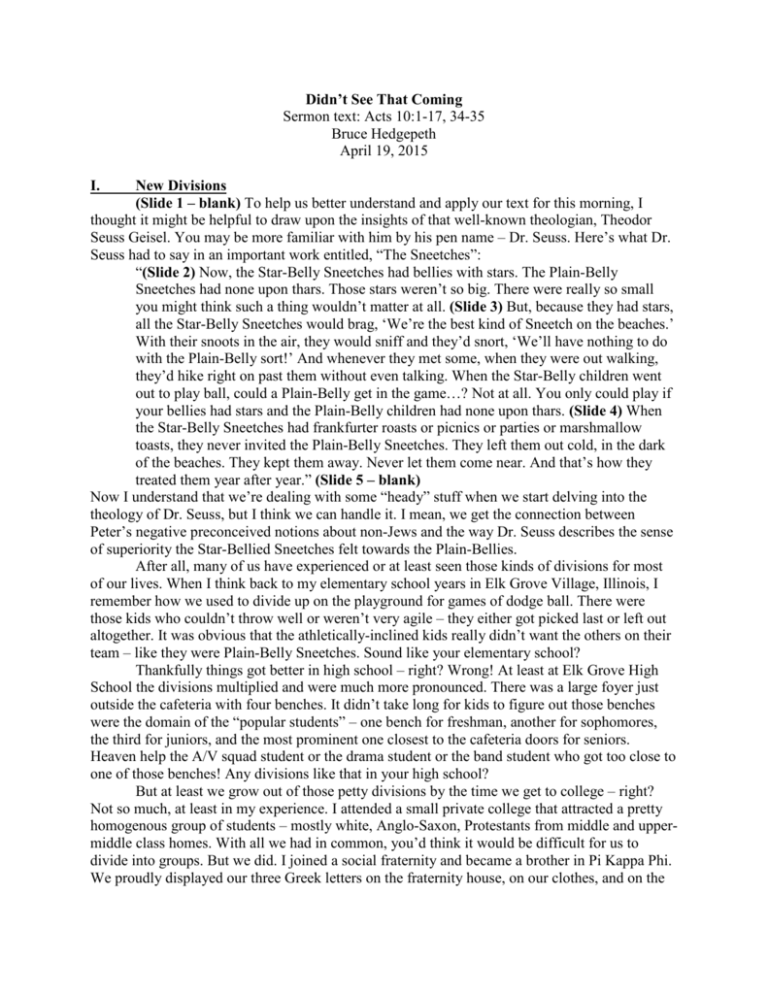
Didn’t See That Coming Sermon text: Acts 10:1-17, 34-35 Bruce Hedgepeth April 19, 2015 I. New Divisions (Slide 1 – blank) To help us better understand and apply our text for this morning, I thought it might be helpful to draw upon the insights of that well-known theologian, Theodor Seuss Geisel. You may be more familiar with him by his pen name – Dr. Seuss. Here’s what Dr. Seuss had to say in an important work entitled, “The Sneetches”: “(Slide 2) Now, the Star-Belly Sneetches had bellies with stars. The Plain-Belly Sneetches had none upon thars. Those stars weren’t so big. There were really so small you might think such a thing wouldn’t matter at all. (Slide 3) But, because they had stars, all the Star-Belly Sneetches would brag, ‘We’re the best kind of Sneetch on the beaches.’ With their snoots in the air, they would sniff and they’d snort, ‘We’ll have nothing to do with the Plain-Belly sort!’ And whenever they met some, when they were out walking, they’d hike right on past them without even talking. When the Star-Belly children went out to play ball, could a Plain-Belly get in the game…? Not at all. You only could play if your bellies had stars and the Plain-Belly children had none upon thars. (Slide 4) When the Star-Belly Sneetches had frankfurter roasts or picnics or parties or marshmallow toasts, they never invited the Plain-Belly Sneetches. They left them out cold, in the dark of the beaches. They kept them away. Never let them come near. And that’s how they treated them year after year.” (Slide 5 – blank) Now I understand that we’re dealing with some “heady” stuff when we start delving into the theology of Dr. Seuss, but I think we can handle it. I mean, we get the connection between Peter’s negative preconceived notions about non-Jews and the way Dr. Seuss describes the sense of superiority the Star-Bellied Sneetches felt towards the Plain-Bellies. After all, many of us have experienced or at least seen those kinds of divisions for most of our lives. When I think back to my elementary school years in Elk Grove Village, Illinois, I remember how we used to divide up on the playground for games of dodge ball. There were those kids who couldn’t throw well or weren’t very agile – they either got picked last or left out altogether. It was obvious that the athletically-inclined kids really didn’t want the others on their team – like they were Plain-Belly Sneetches. Sound like your elementary school? Thankfully things got better in high school – right? Wrong! At least at Elk Grove High School the divisions multiplied and were much more pronounced. There was a large foyer just outside the cafeteria with four benches. It didn’t take long for kids to figure out those benches were the domain of the “popular students” – one bench for freshman, another for sophomores, the third for juniors, and the most prominent one closest to the cafeteria doors for seniors. Heaven help the A/V squad student or the drama student or the band student who got too close to one of those benches! Any divisions like that in your high school? But at least we grow out of those petty divisions by the time we get to college – right? Not so much, at least in my experience. I attended a small private college that attracted a pretty homogenous group of students – mostly white, Anglo-Saxon, Protestants from middle and uppermiddle class homes. With all we had in common, you’d think it would be difficult for us to divide into groups. But we did. I joined a social fraternity and became a brother in Pi Kappa Phi. We proudly displayed our three Greek letters on the fraternity house, on our clothes, and on the bumpers of our cars. On the athletic field the competition was brutal when one fraternity played against another. It was frowned upon to have friendly relationships with the guys in other frats – especially Lambda Chi Alpha. Can you relate? The point is that by the time we become adults we tend to assume that it is “normal” and acceptable to be divided from others: divided by neighborhood; divided by race; divided by political party; divided by finances. I’m not so sure we ever outgrow the tendency to divide ourselves from one another. II. Old Divisions In our passage for this morning, we heard that the same tendency for people to divide from one another existed in biblical times. You can see it in Peter’s reaction to the food that he saw spread out on the sheet in his vision. It was food that he had learned never to eat. Not eating that “unclean” food divided him as a Jew from non-Jews. It made him better. It made him superior. It showed he was among those favored by God. But in this vision the Lord told Peter something unexpected. God commanded Peter to eat the “unclean” food. Almost immediately, so the connection was obvious, the two servants and one devout soldier from Cornelius, a Roman centurion, arrived looking for Peter. They were all non-Jews, and before the Lord spoke to him in the vision, Peter would not have associated with them because they were “unclean.” He definitely would not have gone to Cornelius’s house. But because of the vision, Peter went. He entered the home of Cornelius and shared the good news of Jesus Christ with many non-Jews gathered there. Peter witnessed the Holy Spirit touch those God-fearing gentiles as they came to faith in Jesus. But here’s the most amazing thing – reaching the gentiles was God’s plan all along! It was just that Peter and the Jews had convinced themselves differently over the years. Do you remember all the way back to the beginning of our journey through God’s great story in the Bible? Way back in September we looked at the book of Genesis. We learned about the covenant, the promise, God made with Abraham. Listen again to what the Lord said in Genesis 12, beginning in verse 1: Go from your country and your kindred and your father’s house to the land I will show you. I will make of you a great nation, and I will bless you, and make your name great, so that you will be a blessing. I will bless those who bless you, and the one who curses you I will curse; and in you all the families of the earth shall be blessed. Did you get that last part? God promised Abraham that through him all the families of the earth would be blessed. It was the Lord’s plan from the beginning. And remember last week, how Pastor Steve talked about the Great Commission at the very end of Matthew’s gospel? Remember the word that the risen Christ repeated in those verses? All. “Go therefore and make disciples of ALL nations, baptizing them in the name of the Father and of the Son and of the Holy Spirit, and teaching them to obey ALL that I have commanded you. And remember, I am with you ALL your days.” Reaching all people with the good news of what God has done for us in Christ Jesus was the plan all along. Then at the very beginning of the book of Acts, the risen Christ repeated it again. Jesus told the disciples to wait in Jerusalem to receive power from God for their ministry. Here’s how it’s recorded in Acts 1:8: “But you will receive power when the Holy Spirit has come upon you; and you will be my witnesses in Jerusalem, in all Judea and Samaria, and to the ends of the earth.” Do you hear that? The Lord told his followers that they would share the story of their relationship with Jesus beginning in Jerusalem, but continuing out in expanding circles to the rest of the province of Judea and then into the neighboring area of Samaria and eventually throughout the whole world. Acts 1:8 is actually the blueprint for how we will see the Spirit work as the book of Acts unfolds. On the day of Pentecost in Jerusalem, the disciples received the power from the Holy Spirit that Jesus described. Peter preached to Jews from all around the world the truth that Jesus is Messiah and thousands believed. He and the other disciples were witnesses in Jerusalem. Then Acts tells us about the opposition from Jews who didn’t believe in Jesus that led to the stoning of Stephen and the scattering of the believers to other places. Those places were in Judea and Samaria – where they continued to witness to their relationship with God through Jesus. Our passage for this morning is part of the spread of the gospel to Judea and Samaria, where Cornelius’s home in Caesarea was located. It shouldn’t have come as a surprise that a Roman centurion and his family received the truth about Jesus, believed it, and were filled with Holy Spirit – just like the Jewish disciples had been in Jerusalem on the day of Pentecost. It happened as Jesus said it was going to happen. But Peter didn’t see that one coming! III. Bridging the divide I think it still happens that way for us – we often don’t see it coming when God is up to something new and exciting. And I think it happens most frequently when we extend ourselves beyond our “comfort zone” – very much like Peter did when he entered the home of a gentile who, even worse, was a Roman centurion. I had one of those “didn’t see that one coming” experiences that impacts my life to this day. It was back in seminary when I went with two other students to Guatemala with our Missions professor, who had served as a missionary for many years in that Central American country. Our professor took us to places tourists would go: the Zona Rosa shopping district in Guatemala City, the colonial capitol called Antigua Guatemala, and the impressive Mayan ruins in El Peten. It was interesting for us to see those places, but it was also comfortable because we knew what to do as tourists – we toured. But our professor worked in some other visits. After sipping coffee at a fancy hotel, he took us to a squatter settlement on the outskirts of the city. After visiting the colonial capitol, we met with internally displaced Guatemalans who were being hunted by their own government. After visiting the Mayan ruins, he arranged an overnight stay for each of us with a poor, rural Mayan family. Each one of us saw God in ways we didn’t expect among the poor, the persecuted, and those who lived literally on the margins of society. I didn’t see it coming. What I also didn’t see coming was the question that forced its way into my mind: if these kinds of things that I believe break God’s heart happen in Guatemala, then I wonder if similar kinds of things happen in the States but I just don’t see them? Wrestling with that question is part of my commitment to mission partnerships in Latin America. It is partly what motivates me to serve in our Food Pantry and tutoring ministry and when we host Family Promise families. It’s partly why I believe so much in what we do in the Day of Hope. I suppose it’s the same theological truth Dr. Seuss made at the conclusion of the Sneetches: (Slide 6) But McBean was quite wrong. I’m quite happy to say that the Sneetches got really quite smart on that day, the day they decided that Sneetches are Sneetches and no kind of Sneetch is the best on the beaches. That day, all the Sneetches forgot about stars and whether they had one, or not, upon thars. My guess is the Sneetches didn’t see that one coming. How about you? What is it that may be dividing you from other people who God loves – people who Christ died for? Why not step across that dividing line. Who knows? The Lord may just have something in store for you that you didn’t see coming.
